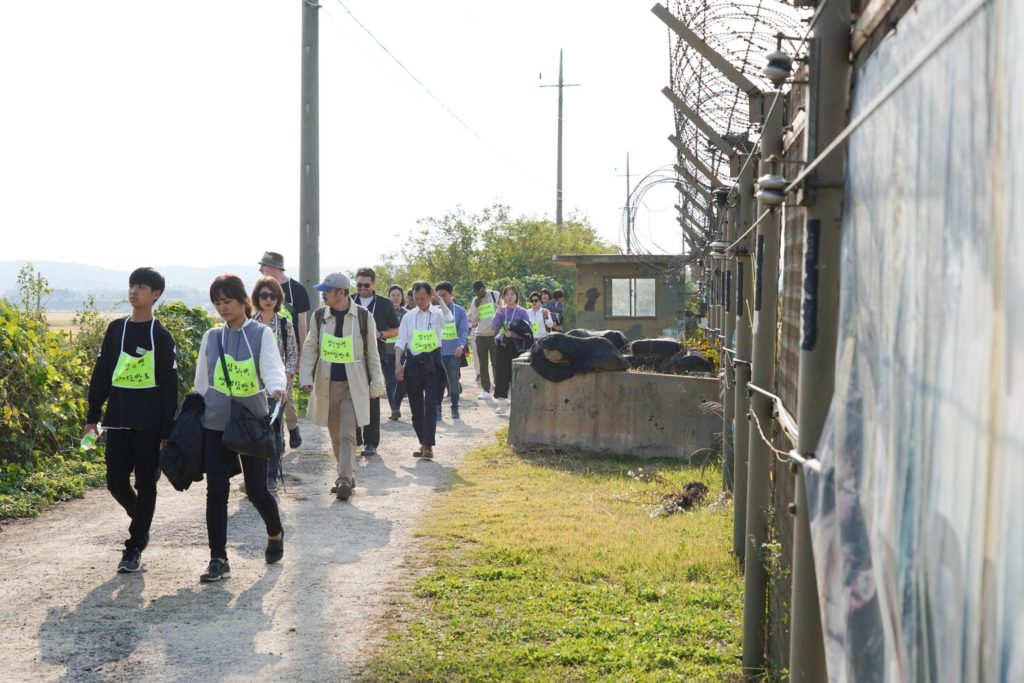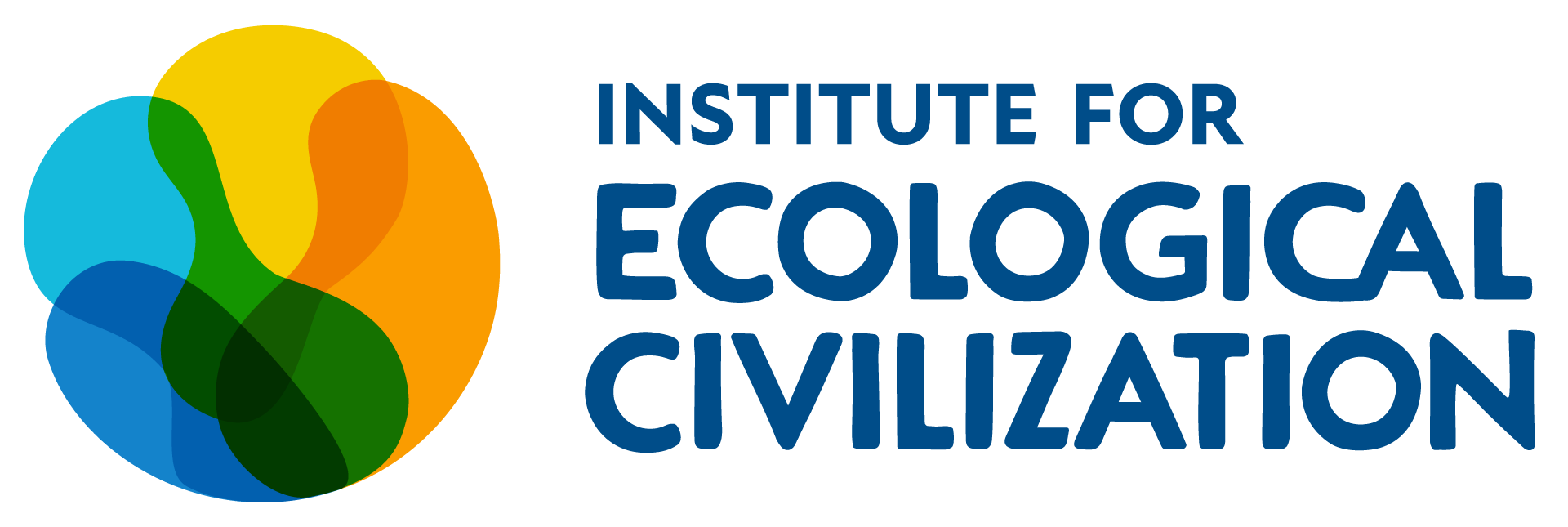Three Ecological Transition Conferences in Korea

By Yunjeong Han, Research Fellow at the Center for Process Studies
On the last day of the ‘Ecological Transformation on the Korean Peninsula and East Asia’ conference (October 12-14, 2018), participants walked 6 miles along the DMZ (Demilitarized Zone) eco-trail. This green belt runs between South Korea, looking to transition from its industrial economy to an ecological civilization, and North Korea, which is taking the first steps towards opening diplomatic relations and economic development. We discussed the content covered over the three-day conference and shared plans for next steps, while admiring the beautiful mountains and rivers – well-preserved thanks to the 65-year-long division of the Korean Peninsula. We were satisfied with the success of the conference, and hopeful for what the future will bring.
Paju City, where the conference was held, is a small town northwest of Seoul, very close to the Military Demarcation Line. Just before embarking on the trail, six organizations that hosted or participated in the conference (People for Earth Forum, the Seoul National University-Hanshin University Post-Human Research Project, the Global Academy for Future Civilization of Kyung-Hee University, Institute for Ecological Civilization, Institute for Postmodern Development in China, Center for Process Studies) signed the Paju Declaration. The Declaration consisted of a preamble and 10 agendas:
1. The Worldview of Ecological Civilization
2. Responsibility as Global Citizens
3. Establishing an Ecological Economy and Systems of Collaboration
4. Resetting the Ecological Path of Science and Technology
5 The Value of Earth Jurisprudence and the Need for Global Governance
6. Revolutionary Transformation of Educational Institutions,
7. Ecological Transition on the Korean Peninsula and a Global-scale
Campaign
8. The Constant Maturation Process of Self-reflection
9. Urging Future Generations to Participate
10. Creative Organizations and an Ecological Network
Ecological civilization is the alternative future we need and desire. Our goals are coexistence with the Earth, peace, and economic justice. In June 2015, Dr. John B. Cobb, Jr. organized a conference titled ‘Seizing an Alternatives: Toward Ecological Civilization’. The ‘Ecological Civilization (EcoCiv) in Korea Project’ was born out of that event, and the group hosted the 1stInternational Conference on ‘Green Transition toward Ecological Civilization: A Korea-US Dialogue’ in Claremont, CA in November 2017. The People for Earth Forum and SNU-HU Post-Human Research Project, participants in last year’s Claremont conference, co-organized this year’s Paju conference together with the EcoCiv Korea Project. The Paju conference introduced the concept of ‘ecological civilization’ to South Korean society for the first time, where the term ‘ecology’ is a biological concept, and ‘civilization’ evokes notions of imperial or religious power.
The conference sessions included topics covering philosophy, economics, neuroscience, STS (science, technology, and society), law, culture, and education. There were 20 presenters, 12 discussion panels, and over 140 audiences for three days. Most of audiences were members of People for Earth and hailed from various fields, including lawyers, scientists, artists, journalists, scholars, and graduate students. People for Earth, led by attorney and former Minister of Justice Kumsil Kang, hosts several study groups on topics such as the ‘Ecozoic Era’, ‘climate and culture‘, and ‘Earth jurisprudence’. This organization has ambitious spread ecological discourse throughout the Korean peninsula, particularly in relation to the issue of reconciliation with North Korea. This year’s Paju conference was also People for Earth’s first attempt to begin building an overseas network for this cause.
Ecological transition is an important issue in South Korea. Inaugurated after the ‘Candlelight Revolution’ of 2016, President Moon Jae-in chose to shut down nuclear power plants as a major energy policy. Unfortunately, the nuclear power plant under construction will continue to be built, though no new plans are made. Economic policy focuses on distribution rather than growth. Initiatives of the central government are slow-moving, and often faces strong opposition from the interest groups. Local governments are further ahead, testing policies that drive community-making, local economies, and energy self-reliance – all of which promote ecological civilization.
The EcoCiv Korea Project has formed a cooperative relationship with the city of Seoul. The Seoul Metropolitan Government held the ‘International Conference for Transition city, Seoul 2018’ (October 11), another connection made through last year’s gathering; Mayor Park Won-soon had sent a video message for the 2017 conference. In the recent Seoul conference, Dr. John Cobb and Dr. David Korten gave keynote speeches on opportunities and strategies for big cities like Seoul to participate in building an ecological civilization. The audience, which included urban planning professionals, appeared inspired by the policy implications of ecological civilization discourse. Dr. Cobb, Dr. Korten, and many other participants from CPS and Institute for Ecological Civilization (Philip Clayton, Andrew Schwartz, Zhihe Wang, Meijun Fan, Gunna Jung, and myself) spoke with Mayor Park about the need for ecological civilization, who in turned promised Seoul’s efforts towards that objective.
The third and final conference was the ‘International Forum on Ecological Urban Regeneration in Northeast Seoul’ (October 15). Among the 25 boroughs of Seoul, 4 boroughs in the northeast region of the city co-organized this conference. These areas are surrounded by beautiful mountains and enjoy relatively healthy environments, but suffer from underdevelopment and a high unemployment rate. Residents and civil activists are cooperating with local governments and universities for economic, cultural, and environmental regeneration.
These three conferences and participants visiting from abroad attracted much attention from Korean media. Major newspapers, including the Hankyoreh, Joongang Ilbo, and Kyunghyang Shinmun, reported on Dr. Korten’s conversation with Mayor Park about building community and local economy, as well as Dr. Cobb’s interview regarding his newly-translated anthology Ten Ideas for Saving the World’ Dr. Cobb also gave a lecture on the role of religion and science in the transition toward ecological civilization at The Center for Religion and Science (CRS) of Hanshin University, which signed a Memorandum of Understanding with CPS.
The ecological civilization movement in Korea has launched successfully. The Seoul metropolitan government, civil and academic society has begun building a positive relationship with CPS, Institute for Ecological Civilization, and IPDC. The EcoCiv Korea Project is working to create a new future with colleagues in US, China, Japan, and Germany. We can cooperate and support each other, while pursuing our respective projects at our home base. The October 2018 conferences in Korea demonstrated that we are all indeed interconnected.
